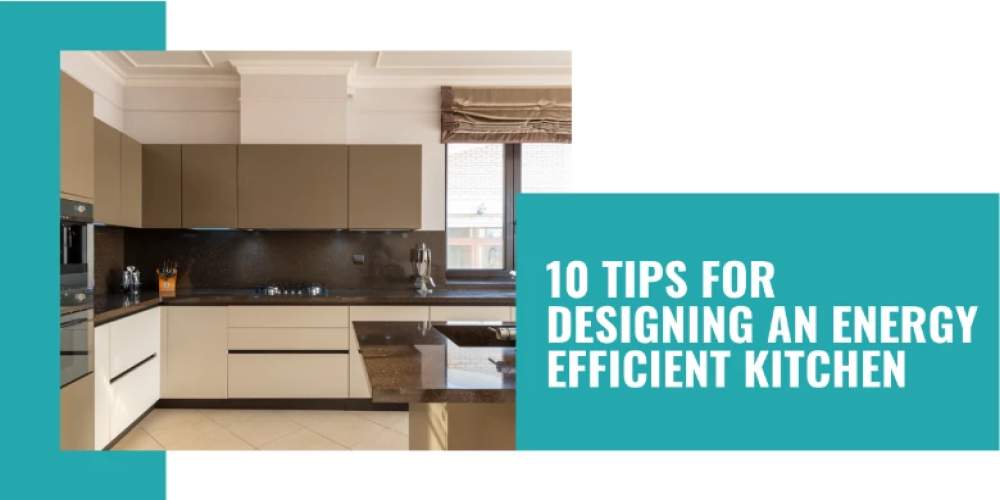
According to the Department of Energy, it is estimated that our kitchen appliances consume nearly 15% of a household's total energy usage. Now, couple that with additional energy costs related to heating, cooling, and lighting, and it becomes apparent that the kitchen can be a significant player in your home's overall energy consumption.
But what if your kitchen could be designed to be energy efficient? What if every appliance, from your refrigerator to your convection oven, helped you make delicious meals and contributed to a more sustainable planet?
Let's explore the idea of efficient kitchen design, incorporating energy-efficient appliances and strategies, focusing on less energy usage, optimizing natural light, and using sustainable materials.
COMPARE PRICES FROM LOCAL INSTALLERS
Compare prices from local companies fast & free
Enter your postcode to compare quotes from leading professionals. We promise to keep your information Safe & Secure. Privacy Policy
The Importance of an Energy-Efficient Kitchen
The kitchen is a space filled with the mouth-watering aromas of your culinary adventures and is also a hub of energy consumption, quietly impacting your energy bills and the environment. Transforming your kitchen into an energy-efficient space is an important journey towards a more sustainable lifestyle.
Every appliance in your kitchen, from your oven to your refrigerator, consumes energy. But what if these kitchen appliances were designed to use less energy? Energy-efficient kitchen appliances reduce energy usage and significantly minimize your carbon footprint.
Energy efficiency doesn't stop at cooking. It extends to elements like lighting and water usage. By optimizing natural light through the strategic use of windows or glass doors, you minimize the need for artificial lighting.
Energy-efficient appliances might require a higher initial investment, but they save money in the long run. Lower energy costs become evident in your utility bills, proving that being eco-friendly can also be budget-friendly.
An energy-efficient kitchen offers a dual advantage--it helps the environment and saves money. It transforms your kitchen from just a space for cooking into a sustainable powerhouse, blending functionality with responsibility. This is the beauty of an energy-efficient kitchen.
Kitchen Cabinet Efficiency
When considering energy efficiency in the kitchen, appliances like refrigerators and ovens usually take center stage. But have you ever considered how your kitchen cabinets contribute to this effort?
Efficient kitchen design strategically places cabinets to capitalize on natural light, reducing the need for artificial illumination. Glass doors on upper cabinets can also help distribute light more evenly, contributing to energy efficiency and a welcoming ambiance.
Customize your cabinets based on what you need to store. Overly large cabinets consume extra energy in manufacturing, leading to wasted space, while too-small cabinets may require additional storage units.
Selecting high-quality, durable cabinets, such as those at BestOnlineCabinets, reduces the frequency of replacements, saving energy and money in the long run. Every aspect of your kitchen, including your cabinets, plays a part in creating an energy-efficient, eco-friendly space. Blending style, function, and sustainability in your green kitchen design is the goal.
Sustainable Materials
Doing in-depth research into designing an energy-efficient kitchen isn't merely about selecting the most energy-efficient appliances or an innovative layout. One often-overlooked element that plays a pivotal role is the material used for the different elements in the kitchen.
Choose sustainable materials like bamboo or reclaimed wood when choosing cabinets. This decision reduces your kitchen's environmental footprint and imparts an appealing aesthetic touch, elevating your kitchen design.
But the realm of sustainability shouldn't end at the cabinets. It's equally important to address the countertops. Consider utilizing materials such as recycled glass or composite stone—these sustainable options can offer style and durability while respecting the environment.
Moving on to kitchen appliances, selecting energy-efficient models can generate substantial savings over time. Consider devices like convection ovens, recognized for their efficient heat transfer mechanism that can help reduce cooking times and energy usage.
Renewable Energy Integration
Integrating renewable energy solutions is the most exciting part of an energy-efficient kitchen design. And when we talk about renewable energy, the first thing that usually comes to mind is solar power.
Imagine preparing a delicious meal for your family using solar energy harvested directly from rooftop solar panels. It's not just about the cost savings, though that's a substantial advantage. It's about creating a kitchen that's more in tune with the environment, a sustainable kitchen that leverages renewable resources and reduces reliance on traditional energy sources.
A significant move towards integrating renewable energy in your kitchen is switching from gas stoves to induction or electric stoves powered by your solar energy system. Induction stoves heat more evenly and reduce cooking time, leading to less energy consumption overall.
In terms of appliances, energy-efficient options such as modern refrigerators, dishwashers, and convection ovens are designed to work well with renewable energy sources. These appliances are designed to use less energy, produce less heat, and be more efficient.
Integrating renewable energy reduces energy costs and positively impacts the environment by lowering your carbon footprint. This energy transition in your kitchen is a small but significant step towards a sustainable, eco-friendly lifestyle, so it is worth investing in solar power.
Efficient Lighting
A vital aspect of an energy-efficient kitchen design is how you light your cooking space. The key here is to optimize natural light and pair it with a practical, energy-saving artificial lighting system. This is where efficient LED technology comes into play.
LED lights have revolutionized the way we light our homes. Compared to traditional incandescent or halogen bulbs, LEDs use significantly less energy, turning about 70% of it into light and only wasting 30% as heat. That's a stark contrast to traditional bulbs, which reverse those numbers.
Beyond being energy-efficient, LED lights are cost-effective, too. Though the initial investment might be slightly higher, LEDs last much longer than traditional ones, saving you on replacement costs. Plus, the energy savings you gain over time outweigh the upfront cost.
The strategic placement of LED lighting can also enhance your kitchen's aesthetic appeal and functionality. Ambient lighting can be used for general illumination, task lighting for specific jobs like cutting and washing, and accent lighting to highlight design features.
High-Quality Appliances
You will find a superstar team of high-quality appliances at the heart of every energy-efficient kitchen design. They are the workhorses, delivering delectable meals and drinks, all while contributing to energy savings and a healthier planet. So, what does it take to build this all-star kitchen lineup?
Let's start with the cornerstone: the stove. The gas hob has become a favorite among energy-conscious cooks. It transfers heat directly and allows precise temperature control, resulting in shorter cooking times and more efficient energy use than traditional ones.
Keeping food fresh is also essential.
The refrigerator, one of the heaviest energy consumers among kitchen appliances, demands careful selection. A high-efficiency fridge not only lowers your energy usage but can also reduce food waste significantly by keeping your food fresher for longer.
But what about cleaning up after your culinary masterpieces? Dishwashers are the unsung heroes here. New models are surprisingly water and energy-efficient. They adjust to the load size, ensuring no extra water or power is wasted.
Ovens deserve a special mention too. Energy-efficient ovens, especially convection ovens, distribute heat more evenly around the food, reducing cooking time and energy usage.
Moreover, the little heroes, like toasters and microwaves, deserve their place in the limelight. Energy-efficient models are readily available and significantly contribute to your kitchen's energy efficiency.
Regular Maintenance and Monitoring
Investing in an energy-efficient kitchen is one thing, replete with high-quality appliances and thoughtful design. Yet, the other critical element is regular maintenance and monitoring of your kitchen to ensure its efficiency is not just a one-off event but a continuous process.
Regular maintenance isn't just about keeping your kitchen clean and attractive. It's a practice that directly influences the lifespan of your appliances and their energy performance. Dishwashers, refrigerators, ovens, and even the gas hob require routine checks to keep them in peak condition. These small acts of care can yield considerable energy savings, from cleaning filters to ensuring seals are intact.
Energy monitoring can also help you fine-tune your usage habits. Are you making the most of your refrigerator's space, or are you overstuffing it, making it work harder and consume more energy? Is your dishwasher running on a half load, wasting water and power? Such minor adjustments can lead to significant savings.
Regular maintenance and monitoring are the backbone of an energy-efficient kitchen. It's the practice of ensuring your energy-efficient kitchen design functions as intended, yielding cost-effective, sustainable results.
Smart Refrigeration
A smart refrigerator is about more than just advanced features or internet connectivity. It embodies a broader concept: optimal usage, correct placement, and efficient maintenance. Ensuring the fridge is not near a heat source, like ovens or direct sunlight, can reduce the energy needed to keep it cool. Similarly, maintaining a safe distance from the wall facilitates air circulation and efficient heat transfer.
Maintaining the refrigerator seals and setting the right temperature are also essential. A slight increase in temperature can lead to a substantial decrease in energy usage without compromising the freshness of your food.
Smart refrigeration extends to conscious habits, too. Minimizing the frequency and duration of door openings can save energy. The same applies to cooling hot food before placing it in the fridge.
Insulation and Sealing
Insulation in the kitchen is a game-changer. Whether the walls, floor, or ceiling, well-insulated areas prevent heat loss during winters and keep the heat out during summers. This maintains a comfortable kitchen environment and reduces the demand for heating and cooling systems, promoting energy efficiency.
Sealing is another vital part of an energy-efficient kitchen. Cracks and gaps around windows, doors, and vents can allow drafts to enter, making your heating or cooling appliances work harder and consume more energy. Ensuring these are properly sealed prevents air leakage, resulting in energy savings.
Insulating and sealing are open to more than just the broader kitchen space. They extend to appliances too. For instance, the seals on your refrigerator and oven doors are critical to energy efficiency. Regularly inspect and replace worn-out seals to ensure optimal appliance operation.
Proper Ventilation
Proper ventilation plays a pivotal role in building an energy-efficient kitchen. It goes beyond merely refreshing the air — it's integral to creating a safe, comfortable cooking environment, optimizing energy usage, and improving air quality, all components of an efficient kitchen design.
Kitchens naturally produce heat, moisture, and odors in the bustle of cooking. High-quality ventilation systems like range hoods or exhaust fans adeptly handle these by-products, mitigating the need for constant air conditioning and conserving energy.
Humidity control is another critical aspect. Cooking activities can escalate humidity levels, which, if not managed, could lead to problems like mold growth, compromising indoor air quality. Proper ventilation effectively dissipates moisture, maintaining ideal indoor humidity and promoting healthier air quality.
However, striking a balance is crucial. Over-ventilation may inadvertently lead to energy wastage due to the rapid expulsion of conditioned air, putting unnecessary pressure on heating or cooling systems and causing increased energy consumption. The ventilation strategy should ensure adequate air exchange without causing excess energy loss.
Choosing energy-efficient ventilation appliances further enhances your kitchen's energy performance. Devices certified with Energy Star, like range hoods, can bring about energy savings of up to 60% compared to traditional ones.
Water Efficiency
Being mindful of water usage goes hand-in-hand with energy conservation, as heating water is one of the most energy-consuming kitchen activities.
A good starting point is choosing water-efficient appliances. Dishwashers, for instance, can be a significant water and energy saver. Modern dishwashers not only use less water than washing dishes by hand, but they also heat the water more efficiently. Opting for an Energy Star-certified dishwasher can provide significant energy and water savings.
Your kitchen faucet also plays a crucial role. A regular tap can waste more water than necessary, but a high-efficiency faucet aerator can regulate the water flow, leading to impressive water and energy savings.
maintenance of your appliances, especially dishwashers and refrigerators, can help identify potential leaks, ensuring your equipment operates at maximum efficiency.
Water efficiency contributes to a holistic, energy-efficient kitchen design when combined with other elements like energy-efficient appliances, LED lighting, and insulation.
Conclusion
Shaping an energy-efficient kitchen is not just about selecting eco-friendly appliances; it's a comprehensive approach that harmonizes design, functionality, and sustainability. This philosophy extends beyond energy-efficient ovens, refrigerators, and dishwashers, including how we utilize lighting, insulation, ventilation, and water.
High-quality, durable appliances like gas stoves and convection ovens aren't merely energy savers. They're also investments in longevity, reducing the cycle of replacement and waste. LED lighting offers significant energy savings over traditional lights, while appropriate insulation and sealing help retain heat, minimizing energy wastage. Good ventilation makes your kitchen a more comfortable space to cook and helps in effective heat management, reducing the need for excessive cooling.
Smart refrigeration practices, regular appliance maintenance, and good water use make your kitchen energy-efficient. All these intertwined elements have a profound impact on both energy use and our environmental footprint.
An energy-efficient kitchen is a journey toward sustainable living. It's about creating a space where each element, from cooking to cleaning, echoes our commitment to efficiency and environmental responsibility.
Find a local installer
Welcome to the biggest directory of UK renewable energy companies




























